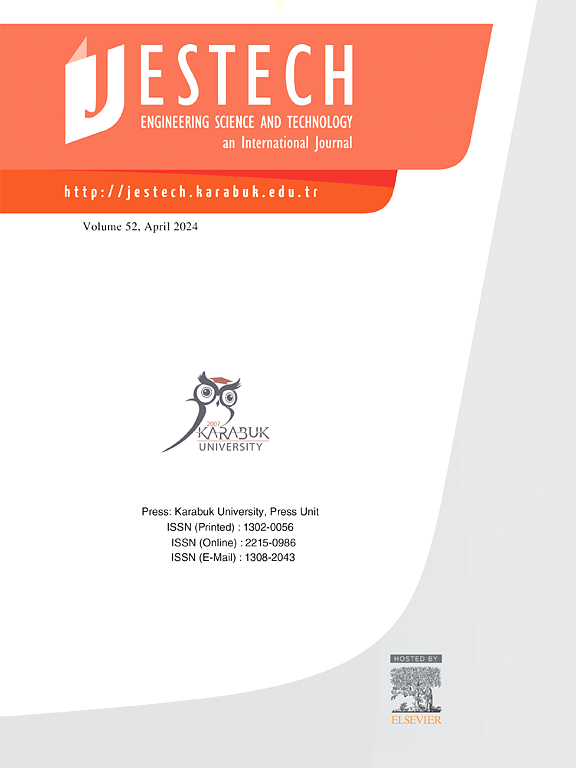Hybridization of DEBOHID with ENN algorithm for highly imbalanced datasets
IF 5.1
2区 工程技术
Q1 ENGINEERING, MULTIDISCIPLINARY
Engineering Science and Technology-An International Journal-Jestech
Pub Date : 2025-02-07
DOI:10.1016/j.jestch.2025.101976
引用次数: 0
Abstract
Machine learning algorithms assume that datasets are balanced, but most of the datasets in the real world are imbalanced. Class imbalance is a major challenge in machine learning and data mining. Oversampling and undersampling methods are commonly used to address this issue. Edited Nearest Neighbor (ENN) and Synthetic Minority Oversampling Technique (SMOTE) are essential methods for undersampling and oversampling, respectively. DEBOHID is a recently proposed differential evolution-based oversampling approach for highly imbalanced datasets. In this work, DEBOHID and ENN methods are combined to present a novel hybrid method called D-ENN. The performance of D-ENN was evaluated using 44 highly imbalanced datasets. A parameter analysis was conducted on D-ENN to determine the optimal values for the F, CR and D-ENN-Type parameters. Three classifiers were used in the study: Support Vector Machines (SVM), Decision Tree (DT), and K-nearest Neighbor (kNN), and reported their G-mean and Area Under Curve (AUC) values. Upon evaluation of the average Winner, Mean Rank and Final Rank values obtained for each classifier and metric pair, the proposed D-ENN method demonstrated superior performance compared to nine state-of-the-art sampling methods, with an average Winner value of 13, an average Mean Rank value of 3.40 and an average Final Rank value of 1.
高度不平衡数据集的DEBOHID与ENN算法杂交
机器学习算法假设数据集是平衡的,但现实世界中的大多数数据集都是不平衡的。类不平衡是机器学习和数据挖掘的主要挑战。过采样和欠采样方法通常用于解决这个问题。编辑近邻过采样技术(ENN)和合成少数派过采样技术(SMOTE)分别是过采样和欠采样的基本方法。DEBOHID是最近提出的一种基于差分进化的过采样方法,用于高度不平衡的数据集。在这项工作中,DEBOHID和ENN方法相结合,提出了一种新的混合方法,称为D-ENN。使用44个高度不平衡的数据集对D-ENN的性能进行了评估。对D-ENN进行了参数分析,确定了F、CR和D-ENN型参数的最优值。研究中使用了三种分类器:支持向量机(SVM)、决策树(DT)和k近邻(kNN),并报告了它们的g均值和曲线下面积(AUC)值。在对每个分类器和度量对获得的平均Winner、Mean Rank和Final Rank值进行评估后,与九种最先进的采样方法相比,所提出的D-ENN方法表现出优越的性能,平均Winner值为13,平均Mean Rank值为3.40,平均Final Rank值为1。
本文章由计算机程序翻译,如有差异,请以英文原文为准。
求助全文
约1分钟内获得全文
求助全文
来源期刊

Engineering Science and Technology-An International Journal-Jestech
Materials Science-Electronic, Optical and Magnetic Materials
CiteScore
11.20
自引率
3.50%
发文量
153
审稿时长
22 days
期刊介绍:
Engineering Science and Technology, an International Journal (JESTECH) (formerly Technology), a peer-reviewed quarterly engineering journal, publishes both theoretical and experimental high quality papers of permanent interest, not previously published in journals, in the field of engineering and applied science which aims to promote the theory and practice of technology and engineering. In addition to peer-reviewed original research papers, the Editorial Board welcomes original research reports, state-of-the-art reviews and communications in the broadly defined field of engineering science and technology.
The scope of JESTECH includes a wide spectrum of subjects including:
-Electrical/Electronics and Computer Engineering (Biomedical Engineering and Instrumentation; Coding, Cryptography, and Information Protection; Communications, Networks, Mobile Computing and Distributed Systems; Compilers and Operating Systems; Computer Architecture, Parallel Processing, and Dependability; Computer Vision and Robotics; Control Theory; Electromagnetic Waves, Microwave Techniques and Antennas; Embedded Systems; Integrated Circuits, VLSI Design, Testing, and CAD; Microelectromechanical Systems; Microelectronics, and Electronic Devices and Circuits; Power, Energy and Energy Conversion Systems; Signal, Image, and Speech Processing)
-Mechanical and Civil Engineering (Automotive Technologies; Biomechanics; Construction Materials; Design and Manufacturing; Dynamics and Control; Energy Generation, Utilization, Conversion, and Storage; Fluid Mechanics and Hydraulics; Heat and Mass Transfer; Micro-Nano Sciences; Renewable and Sustainable Energy Technologies; Robotics and Mechatronics; Solid Mechanics and Structure; Thermal Sciences)
-Metallurgical and Materials Engineering (Advanced Materials Science; Biomaterials; Ceramic and Inorgnanic Materials; Electronic-Magnetic Materials; Energy and Environment; Materials Characterizastion; Metallurgy; Polymers and Nanocomposites)
 求助内容:
求助内容: 应助结果提醒方式:
应助结果提醒方式:


